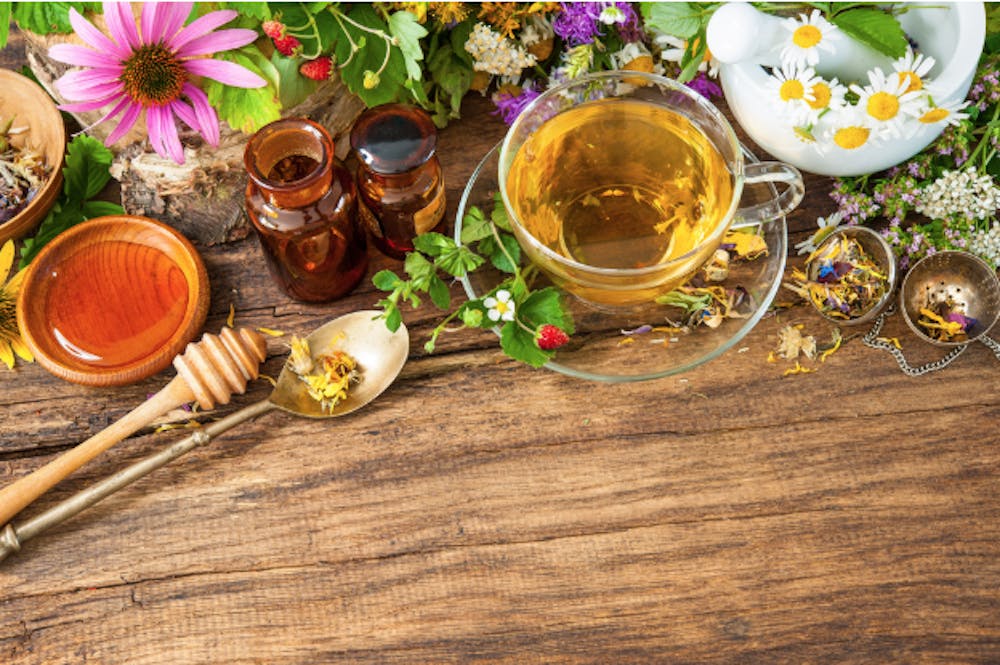Anxiety disorders are the most common mental health disorder in the United States, affecting 40 million adults. That's 18% of the population. Anxiety disorders come in many different forms, such as generalized anxiety disorder, social anxiety disorder, panic disorder, and agoraphobia.
People with anxiety disorders often experience symptoms such as racing heart, shortness of breath, trembling and feeling tense or nervous. Panic attacks are a type of anxiety attack that can happen without warning and can be very frightening. People with panic disorder often live in fear of having another attack and may avoid situations where an attack could occur. Treatment for anxiety disorders usually includes therapy and medication. If you think you might have an anxiety disorder, talk to your doctor. Still, there are some herbal remedies that could help to ease anxiety.
Chamomile
Chamomile tea is brewed using the dried flower heads of the chamomile plant. Chamomile has been used for centuries as a natural remedy for anxiety and insomnia. The calming effects of chamomile tea have been well-documented, and it is a popular choice for those looking for a natural way to reduce stress and promote relaxation. In addition to being a safe and effective treatment for anxiety, chamomile tea is also rich in antioxidants and has anti-inflammatory properties. As a result, it can help to improve overall health and well-being. If you are looking for a natural way to reduce stress and promote relaxation, chamomile tea is definitely worth trying.
Passionflower
Passionflower is a climbing vine that is native to the tropical regions of North and South America. The leaves and flowers of the plant are used to make a tea that is traditionally used to treat anxiety and insomnia. Passionflower tea is mild in taste and can be brewed with other herbs, such as chamomile or lemon balm, to create a more calming effect. Passionflower supplements are also available and are typically taken for their anxiety-reducing properties. While passionflower is generally considered safe, it can cause drowsiness, so it is best to avoid taking it before driving or operating heavy machinery. When taken in moderation, passionflower can be a helpful way to reduce stress and promote relaxation.
Ashwagandha
Ashwagandha is an herb that has been used for centuries in Ayurvedic medicine. The roots of the plant are typically used to make a tea or powder that is taken for its stress-reducing and anxiety-reducing effects. Ashwagandha is also thought to help improve sleep quality and reduce fatigue. While there is no definitive evidence supporting the claims, ashwagandha is generally considered safe when taken in moderation. If you are looking for a natural way to reduce stress, ashwagandha may be worth trying.
Lemon Balm
Lemon balm is a member of the mint family and has a light, lemony scent. The leaves of the plant can be used to make a tea or tincture that is taken for its calming and anxiety-reducing effects. Lemon balm is also thought to help improve sleep quality and reduce fatigue. When taken in moderation, lemon balm is generally considered safe. However, excessive use can cause gastrointestinal upset. If you are looking for a natural way to reduce stress, lemon balm may be worth trying.
Kava Kava
Kava kava is a tropical plant that is native to the South Pacific islands. The roots of the plant are typically used to make a tea or extract that is taken for its calming and anxiety-reducing effects. Kava kava is also thought to help improve sleep quality and reduce fatigue. While kava kava is generally considered safe, it can cause liver damage when taken in large doses or over a long period of time. If you are looking for a natural way to reduce stress, kava kava may be worth trying.
Valerian Root
Valerian root is a flowering plant that is native to Europe and Asia. The roots of the plant are typically used to make a tea or extract that is taken for its calming and anxiety-reducing effects. Valerian root is also thought to help improve sleep quality and reduce fatigue. While valerian root is generally considered safe, it can cause headaches, dizziness, and stomach upset when taken in large doses. If you are looking for a natural way to reduce stress, valerian root may be worth trying.
St John’s Wort
St John’s wort is a flowering plant that is native to Europe, North Africa, and western Asia. The leaves and flowers of the plant are typically used to make a tea or extract that is taken for its calming and anxiety-reducing effects. St John’s wort is also thought to help improve sleep quality and reduce fatigue. While St John’s wort is generally considered safe, it can cause gastrointestinal upset, headaches, and dizziness when taken in large doses. If you are looking for a natural way to reduce stress, St John’s wort may be worth trying.
Rhodiola Rosea
Rhodiola rosea is a flowering plant that is native to Europe and Asia. The roots of the plant are typically used to make a tea or extract that is taken for its calming and anxiety-reducing effects. Rhodiola rosea is also thought to help improve sleep quality and reduce fatigue. While rhodiola rosea is generally considered safe, it can cause gastrointestinal upset when taken in large doses. If you are looking for a natural way to reduce stress, rhodiola rosea may be worth trying.
Conclusion
If you are looking for a natural way to reduce stress, there are many herbs that may be worth trying. Passionflower, ashwagandha, lemon balm, kava kava, valerian root, St John’s wort, and rhodiola rosea are all thought to have calming and anxiety


